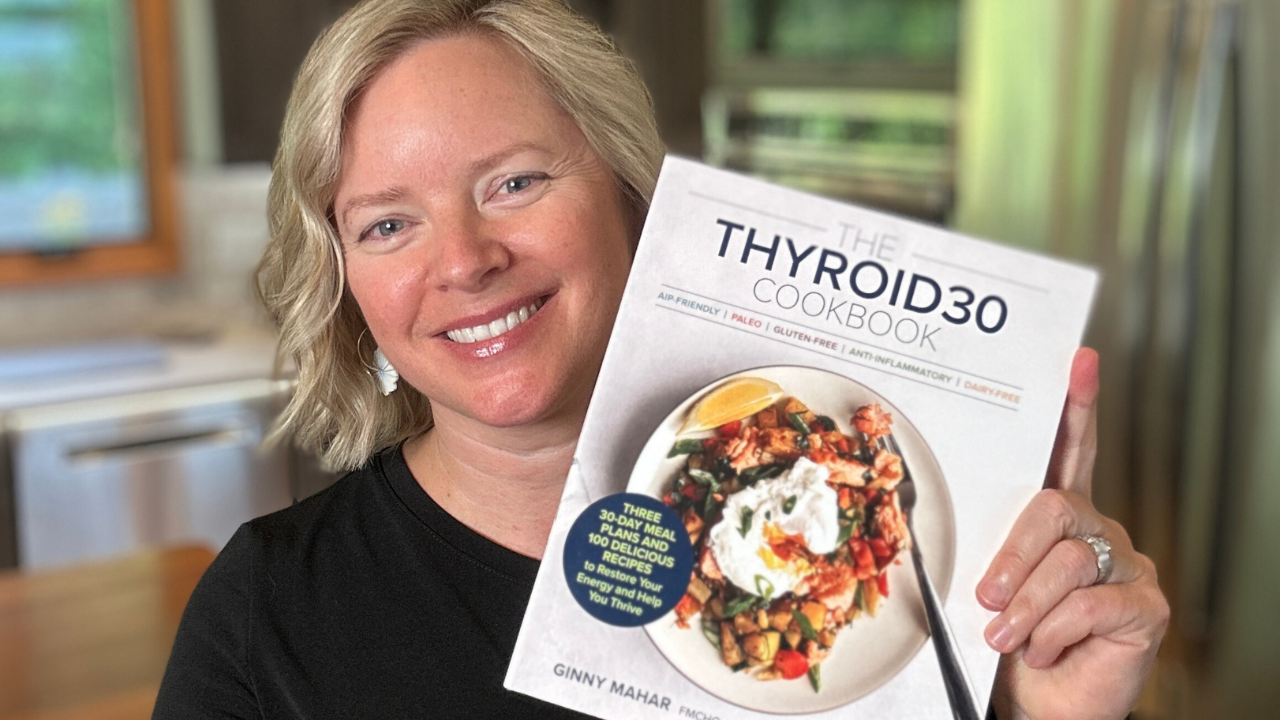Realistic Expectations for our Conventional Thyroid Appointments

We Thyroid Thrivers deal with a lot of frustrations. Symptoms that pop up out of nowhere. Medications that once worked for us but no longer do. The uncanny ability to put on 5 pounds just by looking at a box of donuts. Unskilled phlebotomists turning us into human pincushions. And perhaps worst of all, disappointing doctors' appointments. Womp womp...
We ask for tests and are refused. We ask for certain medications and are refused. We ask about diet and lifestyle interventions, and we get dismissed. We ask why we can't lose weight, and we get told to eat less and exercise more-- like we haven't already tried (and failed at) that! We complain of debilitating symptoms like brain fog, joint pain, and fatigue, and we get told it's all in our heads-- because how could there possibly be something wrong with us when our TSH is "normal?"
UGH. What's a Thyroid Thriver gotta do to get a little decent medical help around here?!
As you may have heard on podcast episode 46: Rethinking Hypothyroidism Treatment, there are issues with the current conventional standard of care for hypothyroidism and Hashimoto's patients. Sadly, that standard has kept many thyroid patients sick and unwell. So what can we do about it? How can we work within this system to get the care we need? And what do we need to know to get us where we want to go faster?
I've learned a lot along the way as a thyroid patient, patient advocate, health coach, and podcast host about what to expect from those conventional doctors' appointments.
Barking up the wrong trees, waiting for that doctor who has a crystal ball in their medical bag, or waiting for someone else to fix us-- these are all dead ends. I know because I've hit these dead ends myself. I don’t want you to waste years of your precious healing time, like I did, having unrealistic expectations from your doctor appointments.
In this blog post and episode of Thyroid-healthy Bites, we'll discuss:
- What NOT to expect from our doctors
- What we SHOULD expect from our doctors
- Some hard truths, red flags, and pitfalls to watch out for
- The difference between various types of medical practitioners
- Helpful "find a good thyroid doctor" resources
- How to empower yourself as a patient
- My vision for a better conventional standard of care for hypothyroidism
Full disclosure: Some of the links in this post may be affiliate links. As an Amazon Associate, I earn from qualifying purchases. Purchasing a product using one of these links will support my work at no additional cost to you. Please know that I only recommend products I wholeheartedly stand by.
Disclaimer: This information is for educational and inspirational purposes only. Always consult with your doctor or other qualified healthcare providers before making changes to your diet, health care, or exercise regimen.
Show Notes:
- Paloma's Complete Home Thyroid Test Kit - 30% OFF Code: HYPOCHEF
- Further Reading: How to Find a Good Thyroid Doctor
- FREE Thyroid-healthy Grocery Guide
- Hypothyroid Chef Website
Podcast Links:
- Listen on the podcast page
- Subscribe on iTunes
- Follow on Spotify
- Subscribe on YouTube
- Subscribe on Google Podcasts
- Subscribe on Amazon Music
- Listen on Stitcher
What NOT to Expect from Our Conventional Doctor Appointments
#1: Stop expecting your doctor to intuit what's going on with your health.
Many of us were raised believing doctors are all-seeing, all-knowing beings. In reality, they're real people who sometimes make mistakes and get things wrong. They have a very high level of education, which enables them to provide the valuable and needed service of medical care and treatment. That doesn't mean they know what it feels like to be YOU.
Hard Truth: Your doctor can’t intuit what's going on with your health. There is no crystal ball inside that medical bag, and becoming a medical medium is not a specialty taught in med school. That high level of education does not mean that your doctor is always right!
Here's what to do instead:
- Keep health notes and communicate clearly with your doctor. Have a few questions or bullet points prepared prior to your appointment in order of highest priority to lowest. If you keep these notes on your phone, you'll always have them with you!
- Understand the time demands most doctors are under. Most primary care physicians are seeing 20 to 30 patients a day, and the average patient visit is only 20 minutes. Remember that it's not a therapy session or a social event, and try to keep the conversation medically relevant and to the point.
- Realize that conventional doctors are working within a healthcare system that can be frustrating and ineffective for both patients and doctors alike. When we recognize these limits, we can find ways to work within them effectively.
Further Reading: How to Find a Good Thyroid Doctor
#2: Stop expecting your doctor to be the CEO of your health.
Right along with expecting doctors to be those all-knowing, all-seeing beings, it's easy to believe they're going to "manage" our health and "fix" whatever is wrong with us.
Hard Truth: While your doctor may care deeply about your health, no one cares about your health as much as you do. When it comes to your health, YOU are in the driver's seat. You make the appointments, you choose the practitioners, and you implement (or ignore) the doctor's advice. You are the only one living inside your body, and you are the one making the choices, day in and day out, that have the greatest impact on your current picture of health. No matter how good they are, no doctor can do the work for you.
Here's what to do instead:
- Embrace that you are in charge of your health. Doctors can advise and, in some situations, take over, but on a day-to-day basis, you are the one in control of obtaining and implementing proper medical advice, educating yourself as a patient, and making the choices that either support or diminish your health.
- When dealing with a chronic illness like Hashimoto's or hypothyroidism, know that there are varying medical opinions on how to treat it, even amongst conventionally trained doctors. Don't be afraid to get a second opinion or interview another doctor if you are unsure that your current one is giving you the validation, options, and care you need.
- Start a "Health Timeline" journal or digital document where you can record your medical history, as well as notes for and from your doctor appointments. This is also a great place to track how various interventions, be they medical, nutritional, or lifestyle, are working for you.
- Always request a copy of your test results and keep track of them. Those records can be hard to find once you switch locales, doctors, etc. Creating a simple spreadsheet where you can record your lab tests, dates, and results can be an invaluable resource for the empowered patient.
- Educate yourself. Checking out a reputable book on thyroid health from the library costs nothing and can be a game changer for understanding your thyroid condition. It can also save you a TON of time at your doctor's appointments.
Further Reading: Why You Should Get Tested for Hashimoto's

Scenes like this? Probably not going to happen at your conventional thyroid appointment!
#3: Stop expecting holistic medical care from conventional MDs.
One powerful and necessary realization on the path to becoming an empowered patient is that there is a fundamental difference between conventional (a.k.a. allopathic) and holistic (i.e., functional, integrative, naturopathic, whole-health) medical care.
Conventional medical care focuses on treatment. Holistic medical care focuses on prevention.
Allopathic physicians (i.e., conventional/traditional/Western doctors) are trained to treat diseases using drugs, surgery, or radiation. These modalities are incredibly important, useful, and life-saving. The allopathic model is backed by a high degree of regulation, drug testing, and scientific evidence.
While conventional medicine has many merits, it is lacking in certain areas. For example, according to an article from Stanford Medicine, "Doctors have historically received almost no nutritional training, which limits their ability to effectively talk to patients about it."
While holistic medicine may lack the amount of scientific evidence, drug testing, and federal regulation that allopathic medicine boasts, it looks at the body as a whole system rather than dividing it up into parts.
Holistic health care also has the mission of maintaining and optimizing health, not just treating injury, illness, or disease. It is more likely to emphasize factors like diet, lifestyle, sleep, stress management, hormonal balance, nutrition, nutrient deficiencies, dietary sensitivities, environmental toxins, and gut health.
There can be overlap, depending on what training and education your doctor has.
Whole-health doctors like functionally-trained MDs or NMDs (naturopathic medical doctors), for example, may utilize both traditional therapies (such as prescription drugs) and holistic therapies (like diet, lifestyle, and supplements) as part of a treatment plan.
Thyroid treatment from a doctor with some of these holistic or functional qualifications might include comprehensive root cause testing, targeted supplements, dietary changes, and lifestyle changes, in addition to optimizing thyroid medication.
As patients, we benefit from both philosophies. Someday, we may achieve that ideal where our conventional, insurance-covered health care both PREVENTS and TREATS disease. We’re not there yet. Understanding these differences can save us a lot of time, money, and disappointment at the doctor's office.
Here's what to do instead:
- Stop barking up the wrong trees. If you break your arm, don't call your naturopath. If you want extensive root cause testing and diet and lifestyle advice for your thyroid and/or autoimmune condition, don't expect much from your conventionally-trained family doctor.
- Realize that your conventional MD has very limited training in nutrition. Functional medicine IS diet and lifestyle medicine, and that's why so many of us with chronic health issues have turned to it for health guidance and symptom relief.
- Ask your doctor what kind of training they have so you know what kind of options you can expect from them.
- As a thyroid patient, understand that conventional MDs are often discouraged by health insurance companies from doing any testing that could be considered "medically unnecessary." This can even include testing hypothyroid patients for Hashimoto's, which the vast majority (over 90%) of us in the U.S. and other developed countries have!
- Seek out doctors with some integrative, holistic, naturopathic, osteopathic, or functional medicine training. I often meet doctors in this category who have been inspired to expand their medical training and education as a result of their own thyroid, autoimmune, or chronic illness journey.
Further Reading: What Do Your Thyroid Test Results Really Mean?

#4: Stop expecting one person to solve your health puzzle.
As Thyroid Thrivers, most of us find that there is not one singular solution to our health issues. There can be several underlying factors like gut issues, heavy metal toxicity, chronic stress, sleep issues, dietary triggers, or even toxic relationships that contribute to our health puzzle.
Just like there is often more than one factor influencing our health situation, it often takes more than one healthcare provider to solve it.
Here's what to do instead:
- Embrace the idea of having a health care TEAM. This may include a conventional primary care physician, a holistic doctor like a naturopath, a functional medicine practitioner, a holistic nutritionist, a therapist, a chiropractor, a massage therapist, a physical therapist, and an acupuncturist, just to name a few.
- Embrace the idea of investing in your health. Holistic practitioners are not typically covered by insurance and require out-of-pocket payment. This can be a hard pill to swallow, but may be required to get the healthcare we need in order to feel better.
- If you are paying out-of-pocket for holistic healthcare, request a superbill, which you can use to file a healthcare claim with your insurance-- you may get reimbursed! Also, save those holistic healthcare receipts! Certain holistic healthcare expenses can be deducted from your taxes.
Your health is your greatest wealth, so investing in that may be one of the best decisions you ever make. It certainly was for me. I only wish I would have done it sooner!

SIDEBAR: The importance of having a prescribing physician on your team.
While not every member of your healthcare team needs to be a prescribing physician, you need to have at least ONE on your team in order to obtain prescription thyroid medication. Ask whether your practitioner is a prescribing physician, especially if they are in the holistic or functional realm.
The titles of holistic or functional practitioners can be confusing and can lead you to believe that they are qualified to manage your thyroid medication when they're not. The pitfall that can happen is that these practitioners may suggest over-the-counter treatments and supplements that are neither regulated nor recommended as a replacement for prescription thyroid medication.
Dosing needs to be accurate to regulate your thyroid levels, and it is typically done in micrograms. OTC thyroid glandular supplements, for example, are not regulated and can contain highly irregular amounts of thyroid hormone. Most importantly, they are not personalized to YOU and your needs.

#5: Stop giving your power away to healthcare providers.
Allow me to tell you my personal tale on this one...
For four long years after my initial hypothyroidism diagnosis (2011), I was plagued with thyroid-related symptoms: fatigue, weight gain, joint pain, depression, and generally poor health. Each year, I would go to my once-a-year checkup with my general physician, desperate for help and advice on getting myself unstuck from this dark and scary place. Each time, I would ask what I could be doing differently to feel better and how my hypothyroidism might be affecting me. That thyroid diagnosis was certainly when my trouble started, so I couldn't help thinking that it must have something to do with my declining health.
My former MD told me things like diet and lifestyle changes wouldn't make a difference in my thyroid-related symptoms. She suggested that I simply needed to eat less, exercise more, consider anti-depressants, and accept that being so sick and tired was just a result of "getting older." She reassured me that because my TSH was normal, my thyroid situation was fine, and everything I was dealing with was unrelated to that. Meanwhile, my life and health were falling apart.
By the time I hit my "thyroid rock bottom," I had been told so many times that it was basically "all in my head" that I actually believed I must be either going crazy (or dying from some unknown, underlying disease). If it really was all in my head, I thought, I must be a hypochondriac or have some other psychological disorder. The doctor knows best, right?
Even though I felt like absolute hell and could barely function, I believed the doctor's words were like gospel. I let it override my own knowing, my own wisdom, and my own experience of living inside this body, which is something NO DOCTOR or person outside myself has.
Turns out, I wasn't going crazy at all. I was being dismissed, invalidated, and medically gaslighted. I didn't know any better, and I wasn't an empowered patient...YET.
Mere weeks into working with a new NMD (naturopathic medical doctor) and implementing diet, lifestyle, testing, and supplement changes, I got my energy back for the first time in four years. I had completely forgotten what it felt like to have energy or feel like my normal, joyful self. It had been so long.
My MD was wrong. Diet and lifestyle DO make a difference. Eating less and exercising more can have devastating consequences for thyroid patients. I didn't need an anti-depressant; I needed more testing and someone willing to be my root cause detective. Feeling tired and sick all the time was NOT a normal part of "getting older" for me, especially not in my thirties (as I was during that time).
This is the kind of baloney women hear TOO OFTEN in the doctor's office: "This is your lot in life. Either accept it or consider band-aid medication."
I have since found forgiveness for my former MD, who was following the standard of care she was taught in medical school. I don't believe that she was intentionally gaslighting me but rather following suit with colleagues, with training, and with the patriarchal medical model in which she was "indoctrinated." Still, it cost me dearly. I wish I would have taken the reins, done the research, and paid for holistic help sooner.
In the words of my dear friend and mentor, Mary Shomon, "The right doctor is an important advisor, but you should also trust your own instincts about your health."
Here's what to do instead:
- Learn to tune in and listen to your body. How do you feel? How is that new medication, supplement, dietary, or lifestyle change making you feel? Our bodies give us TONS of valuable feedback if we can train ourselves to slow down, tune in, and trust our instincts.
- If you're struggling, don't let anyone tell you that what you're feeling isn't real. That's the very definition of medical gaslighting. It happens a LOT in health care, and it happens disproportionately to women and people of color.
- Remember that while you may not be a medical expert, you ARE the world's foremost expert on how you feel. If you leave your doctor appointments feeling like you've been told that your suffering and experience aren't real, find a new doctor.
- Remember that your healthcare providers work for YOU. If you aren't getting the help and validation you deserve from your doctor, find a new one.

What SHOULD you expect from your thyroid doctor?
Now that we've established what not to expect and what not to do when it comes to our conventional doctor visits let's talk about what we should expect.
Some of these are standard expectations, while others require that we advocate a bit more actively for ourselves. Just like consumers drive the marketplace, patients have at least some power to drive healthcare. Asking questions, actively seeking out better treatment, sticking up for yourself, voicing your frustrations with the current standard of care-- all these things coming from millions of empowered thyroid patients are what move the needle toward a better standard of thyroid care.
You should be able to expect these things from your conventional thyroid appointments:
- To be listened to and believed regarding what you share with them about your health.
- To be given a complete thyroid panel of tests including TSH, fT3, fT4, and thyroid antibodies, not just TSH.
- Your doctor should be willing to discuss the various options for thyroid medication, including natural desiccated thyroid medication, hypoallergenic synthetic medications (like Tirosint), adding in T3 medication (liothyronine), and writing a prescription for the BRAND NAME that works best for you if you have one.
- Your doctor should not dismiss the residual symptoms that their prescribed medications are not relieving (or even causing).
- While a conventional doctor doesn’t take a root cause approach like a functional medicine doctor does, they should still be willing to consider and have a respectful conversation about the work you’ve done as a patient outside the conventional realm. Eye rolling, scolding, and speaking condescendingly about other medical philosophies are all good signs it's time for a new doctor. Doctors of all types and backgrounds should be able to acknowledge and make space for the blind spots and shortcomings of their chosen dogma.
- Your doctor should not tell you that your symptoms are all in your head, an inevitable part of aging, or your fault.
- Your doctor should treat YOU, the whole human being, not just the lab results. A "normal" TSH level does not invalidate your residual thyroid-related symptoms, nor does it provide an accurate picture of what optimal levels look like for you or how well your body is utilizing your thyroid medication.
- Your doctor should be a prescribing physician who can provide you with prescription thyroid medication and comprehensive thyroid testing.
On the Podcast: Rethinking Hypothyroidism Treatment with Dr. Antonio C. Bianco

Remember, the doctors are (usually) not the villains in this story.
Sadly, a lot of the basic expectations listed above don’t happen at our conventional medical appointments, to the detriment of thyroid patients far and wide. As patients, we have to remember: It's not because the doctors are bad people. It's because the current healthcare system is broken. The doctors are (usually) not the villains in this story. The healthcare system IS.
Here in the United States, what we have is actually a sick-care system, which is necessary, needed, and, in many ways, amazingly effective at things like keeping people alive. It also fails miserably at helping us stay healthy and preventing disease, as our dreadful health statistics show.
As thyroid patients, we are too often denied the testing we need, the medication options we deserve, and the diet and lifestyle advice we want so that we can feel well and thrive. What is taught in medical school is that TSH testing and levothyroxine are all that's needed. This approach may work for some, but it does not work for ALL.
One of the most appalling aspects of standard hypothyroidism care is that even though more than 90% of us have Hashimoto's, or autoimmune hypothyroidism, the test is deemed "medically unnecessary" because it doesn't change the standard treatment plan. During my four dark and long years of suffering, I was never tested for Hashimoto's for this reason.
It confounds me to think that a so-called healthcare system would deem it medically unnecessary to test and inform a patient who is so likely to have an autoimmune disease, especially when one autoimmune disease puts us at an increased risk of developing additional autoimmune diseases.
According to Terry Wahls, M.D., whom I interviewed in 2019, "Autoimmunity has a significant diet and lifestyle component, with a significant portion of your risk coming from how you live, what you eat, and your environment.” In this regard, the conventional system has failed us, sometimes with devastating consequences.

A vision for a better tomorrow in conventional thyroid care...
As a patient, I have been burned by the conventional standard of thyroid care. As a health coach, I hear the heartbreaking stories of others who have also been burned by a system they trusted to help them. That sense of betrayal is not something one soon forgets.
I hope for and dream of a day when the standard of care and the healthcare system is based more on what's best for patients in the long term instead of what's most economical for insurance companies in the short term. Thanks in large part to you, the empowered community of Thyroid Thrivers, there are glimmers that the bar is rising.
The paradigm shift that we find ourselves in these days is indeed affecting our healthcare system deeply. Patients expect more. We’re more educated and empowered. I want to believe that we are also more likely to speak up and use our voices to advocate for ourselves and others.
Change is coming from within the conventional medical community as well. I believe that the vast majority of people who go to medical school do so because they want to help others. More and more doctors who once practiced conventional medicine have become disenfranchised by the dysfunctional model they’re expected to work within and have pivoted and left the system in order to meld conventional medical training with more holistic/functional medical training.
Alas, while the lines dividing conventional and holistic care are beginning to blur, we’re not there yet. We’re still stuck inside this dysfunctional box regarding conventional thyroid care and treatment. What's covered by insurance leaves many of us wanting and some of us, sadly, debilitated.
No one should be left to suffer needlessly and denied the treatment and testing we need to thrive. Having this understanding and awareness is how we get there. For today, I'll continue holding hope for a better tomorrow, and I'll manifest that by sharing my vision for what I would like us to be able to expect from our conventional medical appointments.
Under a better standard of care, a thyroid doctor would help you address these questions:
- Is my body absorbing or converting my medication?
- If I don’t feel my medications are working well for me, is there another medication or medication combo that’s better for me?
- Are there underlying, root cause issues to my hypothyroidism/Hashimoto’s?
- What about diet and lifestyle? How can they help?
- If my TSH is normal, why do I still feel poorly?
- Can I get a complete thyroid panel that includes TSH, free T3, free T4, reverse T3, and antibody testing?
- Is my thyroid condition actually an autoimmune condition?
- If so, can you help me understand my autoimmune thyroid condition and how I can protect my thyroid and my health from worsening or compounding autoimmune conditions?
- Is my downward health spiral related to my thyroid issues, and what can I do to reverse the spiral?
What to do if you are not getting the medical care you need and deserve:
One reality that I want you to leave here understanding today is that getting the care you need and deserve may require either an MD with additional functional medicine training, like those at Paloma Health. Or it will require that you invest in your health to add some new “Players” to your healthcare team who are holistically oriented.
If you’re searching for a new thyroid care doctor (and live in the U.S.) I strongly encourage you to explore your options at Paloma Health. Paloma specializes in thyroid-specific testing, nutrition, and medical care. They offer insurance-covered telemedicine appointments (in most states) with MDs who take a more comprehensive approach to thyroid treatment and offer a higher standard of care.
2023 Update: I now receive my thyroid care from Paloma Health, and I am loving it! My Paloma Membership has saved me loads of money, has made testing easier (and less painful!), and more effective. With the help of my doctor, who specializes in treating hypothyroid patients, I've been able to optimize my treatment and even try LDN (low-dose Naltrexone) to help regulate my autoimmunity. I have nothing but good things to say about my experience as a Paloma Health patient.
One of Paloma's most helpful resources is their Complete At-home Thyroid Test Kit, which is affordable, accurate, and includes TSH, Free T3, Free T4, and TPO Antibodies (optional add-ons: Reverse T3, Vit D3). I’ve partnered with Paloma to get you 30% OFF your test kit with the code: HYPOCHEF.
Their test kits are accurate and affordable, and they are a great way to get onboarded with Paloma and paired with doctors and nutritionists in your area who can help you get the treatment and care you deserve.
In Conclusion
I wrote this blog post and podcast episode with my thyroid advocate hat on in order to provide awareness and solutions for where we are today. The current conventional standard of care for hypothyroidism needs improvement. As patients, we need to be aware of its inadequacies so that we don't end up suffering needlessly or denied the ability to live a functional life.
Due to both my personal health struggles and those of my online community and functional medicine health coaching clients, this cause is one I am passionate about. I've heard too many stories of lives ruined by this standard of care. On the bright side, I've heard just as many stories of recovery gained by taking a more comprehensive approach.
If you are a patient, have hope. You can feel better, but you may need to venture outside the conventional medical box to get there. If you are a doctor, researcher, medical professor, or someone else within the sphere of influence for thyroid care, I invite you to contact me with questions, feedback, or requests for input from my community of "Thyroid Thrivers." I'm sure many of them would be happy to use their voices for the purpose of catalyzing this change.
Wishing you happy thriving, and the best of health,

P.S. Ready to feel better? If you've been struggling, there's a good chance you're missing an essential piece of your healing puzzle: SUPPORT. That's why I created The Thrivers Club, a group health coaching community where together we can learn, grow, and transform! Members get access to exclusive expert content, members-only workshops, monthly wellness challenges, a supportive community of fellow Thyroid Thrivers, a private recipe library, and so much more! Here's what my members have to say about how The Thrivers Club has helped them...
Subscribe to my free newsletter for fresh recipes & lifestyle tips, delivered weekly, and receive a free gift!
By submitting this form, you agree to receive ongoing updates from Hypothyroid Chef












